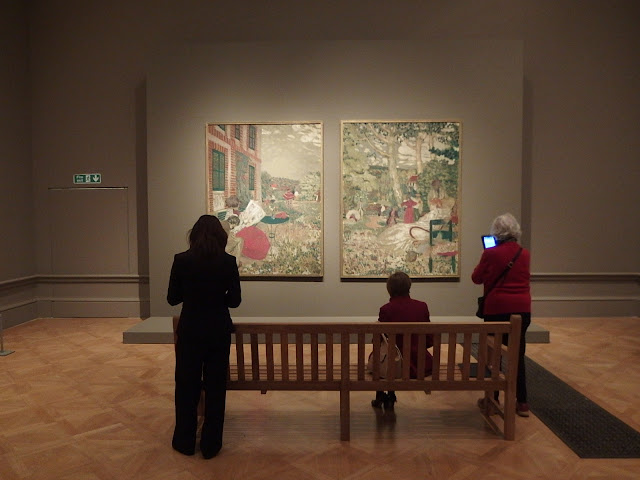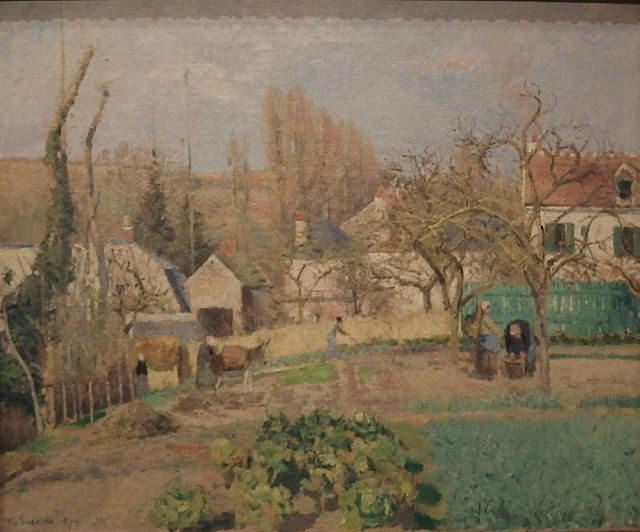Painting the Modern Garden: More than Monet and Lilies
 |
| Louis Comfort Tiffany, 1911 by Joaquin Sorolla An insight into how flowers inspired Tiffany's jewellery and stained glass work. |
I promised I'd say more about the wonderful Painting the Modern Garden at the Royal Academy...
...there is so much to see and think about - more than just Monet and water lilies - and far too much for one blog post. Here are some of my absolute favourites in the hope you'll be tempted to make your own visit.
The paintings featured are selected from the 1860s to the 1920s - roughly the span of Monet's life. For me they helped fill one of the gaps in last year's Painting Paradise exhibition; the extension of the garden from the royal palaces and stately homes featured there and out into the world of ordinary people like you and me.
 |
| Claude Monet Painting in his Garden at Argenteuil, 1873 by Pierre-Auguste Renoir |
The exhibition's featured time period also coincided with an explosion of interest in horticulture. It was a hot topic and benefited from the Victorian need for scientific exploration and personal development.
Scientific monographs were published on many of the garden plants we enjoy today and read avidly by the artist-gardeners featured in the exhibition.
Lots of new hybrids were released onto the market and exhibited in key shows across Europe at that time. Imagine seeing a cactus dahlia for the first time, or the chrysanthemums featured opposite.
This was my favourite painting, but I couldn't photograph it on the day due to restrictions. I'm pleased to see it on the cover of the show's catalogue - one way of seeing the exhibition if you can't get to London.
We've seen already how much gardening and flowers informed the artists of that time via my Muse Day post earlier this week. Here another one - Emil Nolde - who admitted how much they inspired him: "The colour of the flowers drew me magically to them, and suddenly I was painting".
 |
| They may have discussed their art and gardens a lot, but it didn't prevent different styles. Here's Pisarro's (left, 1877) and Monet's (right, 1879) approach to plum trees in blossom |
It wasn't only gardens and gardening which inspired the artists featured. I saw in the exhibition how much they talked to each other. There were lots of visits to each other's gardens and an active correspondence across the artistic community. Despite seeing how the explosion in new hybrids stimulated artistic interest, I was surprised how much William Robinson's approach to gardening also featured as an influence. It struck me well before I found a copy of his The Wild Garden on display.
 |
| In the Gardens of Reverie room, looking at paintings by Edouard Vuillard Woman Reading on a Bench (left) and Woman Seated in an Armchair (right), 1898 |
Another strong theme was the garden as a sanctuary, and a place for relaxation or reverie. I found the same effect at the show too, as did some of my fellow attendees. This was shown particularly in Monet's later paintings at Giverny. He remained there during WW1, with the war booming all around him. His garden became a place of mental healing during that time and stimulated his frenzied outpouring of huge paintings of the garden.
... and of course that outpouring gave us those water lilies. I've always loved these paintings, but I never really appreciated until now just how huge they are. They fill your view and make you feel you're looking over Monet's shoulder at what he saw at the exact scale. Not bad for paintings classed as Impressionist.
 |
| Water Lilies, after 1918 - 200.7 x 426.7 cm |
The exhibition is open until 20th April 2016. Can't get to London? You can tour the exhibition from the comfort of a cinema in April (UK), or May (international release). I see Vue are advertising their screenings already.
 |
| It wasn't all about flowers - kitchen gardens (and sheds) featured too. This is Pisarro's Kitchen Gardens at L'Hermitage, Pontoise, 1874 |
You may also like
Two of the Friday Benches I've featured on my photography blog: View of a Garden and Willow and Water Lilies.
The Royal Academy's website has some wonderful short films of three of the gardens featured in the exhibition, with curator Ann Dumas as your guide. They're the gardens of three of the artists featured prominently: Pierre Bonnard, Henri le Sidaner and Claude Monet.
The website also has an interesting article (and great pictures) on how Monet created his garden at Giverny. For me, this was one of the most fascinating parts of the exhibition, with plans and letters revealing it wasn't a smooth process. Water lilies were regarded with suspicion by the local farmers who worried this unfamiliar plant would poison their livestock.
Also, explore six of the artist-gardeners featured in the exhibition, plus a discussion of the exhibition via Guardian Gardens' Sow, Grow, Repeat podcast.
Good luck to Wendy from Rooftop Veg Plot who's taking part in the RA's Contemporary Urban Gardening event on 27th February.













Michelle, how I wishI could find a way to make the trip across the pond to see this!
ReplyDeleteCindy - it would be wonderful to have you over here! Texas is so far away... *sigh*
DeleteAnother excellent post, and terrific pictures, about this exhibition which I'm hoping to visit. Flighty xx
ReplyDeleteThanks Flighty :-)
DeleteWhat a fabulous exhibition to go to. I love Pisarro's work, and I still remember how completely dumbstruck I was the first time I saw one of the Monet water lily paintings in "real life". They are, as you so rightly say, so huge, and so utterly beguiling. I used to love going to the collection they had in the San Francisco art museum and just sitting there, revelling. Perfect antidote to a busy business trip to the US.
ReplyDelete